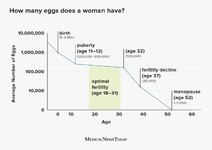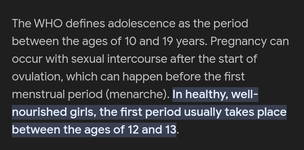I'm 35. Been talking to a girl that's 25. Christian, no vax, homeschooled, conservative, good-looking, lives with her parents, and all that good stuff.
But honestly she feels too old already. Old in the sense of she's still absorbed so much nonsense from Hollywood, social media, new age books, career-driven work culture, etc, and she's clearly infected with cluster B issues that seems to spread like a mind virus with modern females.
After a certain amount of programming, it's hard to detach them from their web of interest. I've said it before but once women get entrenched with friend groups they seem to really cling to them despite however uninspiring and spiritually stifling these relationships are for them (Just think how mothers defend their children even under the most blameworthy circumstances and continually push for reconciliation between unwilling siblings).
Also she just feels too old physically too. I know it's been said before and obvious but worth repeating. The peak fertility years are YOUNG. Gaming/pickup for dalliance and ONS body counts is a different ball game (Highly unrecommended). When kids and homemaking is the priority, why take on the risk for less than ideal offspring especially if we are a man that has his life well put together?!
But again it's not just the physical in my eyes but also the influence of clown world over time. At some point the amount of effort becomes not worth it after a cost benefit analysis.
18-20 would be a lot better, striking before college indoctrination or work rigmarole. One of the main ways around this social taboo is to control for their family/friends. And I don't mean this is any sort of weird way.
Some of the ways to do this are to create a healthy distance, find an introvert, have a foreign wife moved here, or relocate somewhere together whether she is foreign or domestic. There's also pressure from our own family also though, so again overseas becomes a winning scenario.
I want a WIFE to have healthy children with and be a homemaker that will follow my lead and submit. I don't want a best friend or someone that's my 'equal'.
And this calls to mind the stupid egalitarian mindset of worrying that the girl and I will be unable to relate to each other because of the age gap. This is just nonsense.
For instance, is it a problem for me to have friends that are in their 80s? Of course not! I've never found that to be the case that we are unable to bond with each other. It simply doesn't matter. The only reason this matters to people (Feminists and losers mostly) is for the wrong reasons or they just have their minds in the gutter by jumping to grooming and pedo crap.
Just some thoughts. I'm guessing this is going to trigger some people on here because they've made different choices in life. To that I'd say, yes but to your yes but.
Perhaps I should take a break from the deep cutting I'm doing in this thread. I will say I've been a bit negative.
But the title of the thread is "Destruction of Modern Women". If we have a new thread titled "Destruction of Modern Men" I'm not going to go disliking comments that ring true just because they hurt my feelings or aren't expressed eloquently/softly.
If I recall correctly, isn't Starlight the one that went back and forth with you @Bladerunner on this topic? I'm really curious what is the disagreement with anything I've said?
I will take a chill pill in the meantime. Too much reading and reinforcing bad news followed by posting lol. Time for a break. I've been posting way too much lately.
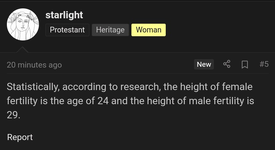
From the American College of Obstetricians and Gynecologists website:
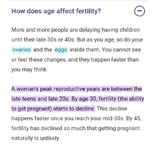
My understanding is that the highest level of fertility is at late teens and then it declines. Is that wrong? Am I to believe that late teens is exactly equal to late 20s? Or that somehow 24 (6-7 years after late teens) is peak fertility? Is it a bell curve starting at late teens, peaking at 24, and curving down into 30s? I would imagine it's a straight line down from late teens to 30s...
Lastly, this overlooks the point that even if I marry a girl who is 24, that's MAYBE six years to have children at a reduced risk (Compared to the ideal, whatever that may be). Wouldn't it be more wise to begin this at 20 for example? My original comments weren't solely about fertility. It's a combination of factors where 18-20 makes most sense.
God wants us to have healthy children and wants enough time to do that. Peak fertility at 24 with a sharp drop-off at 30 doesn't make sense to me.
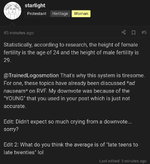
YOUNG is accurate. Even 24 is young. But this is multifactorial also. My original point was addressing a combination of factors before I considered what is hypothetically ideal.
Is that how it works? We just take the average? I'm honestly asking. I'm not crying about the downvote, I just knew why you downvoted it and I remembered this circular argument on the old forum between you and Blade Runner. You just don't seem to get the drift of this topic.
Last edited:

